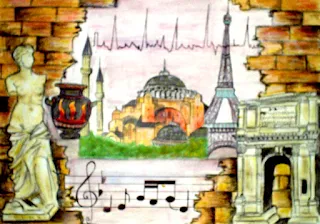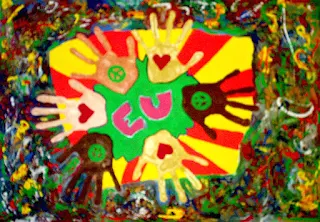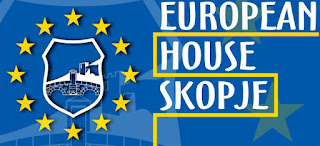That’s
how it is. Life isn’t fair, and reality demands a compromise. These are the
words that Erwen Fouréré, the long-standing EU ambassador to Skopje, a witness
and occasional actor in Macedonia’s troubles, addressed to his hosts, warning
them that the time to reach a deal with Greece over Macedonia’s name was fast
running out.
A month from now the EU will decide
whether Macedonia, after five years of candidate status, will be given the date
for starting negotiations on finally joining the EU. In Macedonia itself,
however, there is a gloomy atmosphere of unfulfilled expectations. It is as if
the Macedonian government and public have come to accept that Macedonia will
draw the short straw in the ‘wrestling match’ at the EU summit in June.
It is most likely, indeed, that the
setting of the date will again be postponed, hopefully until the end of the
year, less optimistically for an indeterminate period. The formal explanation
will be the slowing down, indeed end of reforms; but in reality it is the
failure to reach an agreement with Greece over the country’s name. The conflict
with which Greece has burdened Macedonia, and which until quite recently was
merely a ‘technical problem’ that did not affect Macedonia’s progress towards
EU and NATO membership, has in the meantime grown into an ‘unavoidable
obstacle’. Or rather, into Brussels’s political ultimatum. It is true that the
issue of the name does not appear as a formal condition; but when it comes to
choosing between a state that already is a member (Greece) and a state that
wishes to become one (Macedonia), there will be no dilemma. Despite sympathy
for Macedonia and irritation with the Greek economic assault on EU stability,
Macedonia will get short shrift. The offence will be chalked up against the
weaker side, although everyone knows full well that the stronger one, which
sets the rules, has been playing a highly destructive game.
Though Brussels officials hope for
some turnaround by mid-June, its chances are nil. The Macedonian-Greek
negotiations on Macedonia’s name reached a dead end several months ago, so that
a change in the coming weeks would be truly miraculous. The long-standing
American UN mediator in this conflict, Matthew Nimetz, does not believe in a
sudden change either, and has been postponing the restart of negotiations. For
sure, at the beginning of the this year there was a hope that ‘Republic of
Northern Macedonia’ might, under certain conditions, be acceptable to both
sides. But it vanished the moment the Greeks ‘explained’ that the change of
name from Macedonia to Northern Macedonia would oblige the country to change
also its national identity, its language, its constitution, its national anthem
and its state emblem and flag – a recasting in fact of the whole of its history
and culture.
The Macedonians interpreted this Greek
‘shopping-list’ in the only possible way – as the introduction of a Greek
protectorate. The idea consequently, and logically, died even before it had
been officially endorsed. A section of Macedonian public opinion, and certain
political circles in Skopje, were initially positively inclined towards the
name ‘Northern Macedonia’. But when the Greeks upped their demands, the
Macedonians responded by reviving the old idea of a referendum on the name, the
negative outcome of which is beyond doubt.
Greece responded to the idea of
‘letting the people decide’ by accusing Macedonia of blocking its ‘cooperation’
and ‘good will’ in the search for a ‘mutually acceptable compromise’. In fact,
Greece is in no hurry (though one might think differently, given the
seriousness of its crisis), all the more so because it has finally and without
much effort won the support of EU leaders for its irrational national campaign,
despite the fact that its economic and financial policy has brought into
question the very survival of the euro and of the European Union. Athens can
allow itself the luxury of simultaneously relaxing its chronic inter-state
tensions with Turkey, thus winning the sympathy of Brussels and Washington, and
assuaging European frustrations with the consequences of the Greek economic
collapse. Turkey is more important to the international community than
Macedonia, and the Greek prime minister can therefore afford to risk the wrath
of Greek nationalists at his dialogue with Turkey. The tightening of the screw
on its ‘unreasonable’ Macedonian neighbour comes as a recompense to the
nationalists, at a time of real danger that the domestic crisis might unite the
social and nationalist revolts into a powerful anti-government and anti-EU movement.
This is why the so-called red line of Greek national interests is being
maintained against the small and weak Macedonia, a line that Prime Minister
Papandreas will not dare to cross.
But whereas Greece, therefore, may be
in no hurry to reach a settlement with Skopje (not least because the very
maintenance of mutual tensions causes serious internal trouble for Macedonia),
one would expect Macedonia itself to be keen to arrive at a settlement that
would unfreeze its current status as a forgotten country, and put it on the
path to membership of the EU and NATO. This, however, does not appear to be the
case.
The long and exhausting ‘war’ with
Greece has created a situation of near-complete lethargy, with elements of
indifference. The economic crisis is deepening, investors are avoiding the
country as too risky, the social situation is increasingly hopeless, reforms
have practically ceased, the prospects for Euro-Atlantic integration are
receding – all this is creating anew a deep political crisis characterised by
growing tensions between the country’s Macedonian majority and Albanian
minority.
Instead of intensifying diplomatic
activity, the government headed by Nikola Gruevski (VMRO- DPMNE) seems to have
opted instead for a tactic of silence combined with anticipation, guided by a
strange logic that time is in fact on Macedonia’s side. The idea being, it
seems, that Europe will in time tire of Greek nationalist belligerence and
arrogance, if not because of the Greek tactic of systematically undermining Macedonia,
then because of the catastrophic effect of Greek economic mismanagement on
European stability. Pursuing a tactic of ‘mutual attrition’, Macedonian
nationalism in the form of a ‘return to antiquity’ has been offered as a
response to Greek nationalism (though the intensity of the search for a new
ancient Macedonian identity has somewhat diminished). Convinced that truth and
justice is on its side, the government appears no longer interested in finding
friends and allies abroad, and it is here that the main reason for the current
near-total marginalisation of the country’s international position should be
sought.
An ideological war is instead being
waged against internal critics, with the government using its media to indict
‘traitors’, those who ‘favour selling the national spirit and dignity’ (i.e.
argue for continuation of dialogue with Greece), and this is turning the
Macedonian political scene into an arena of permanent confrontation. There is a
real danger that, in the absence of a speedy internal political agreement,
Macedonia could easily revert to the situation that pertained on the eve of the
armed conflict between the authorities and mutinous Albanians in 2001.
Prime Minister Gruevski is no longer
preoccupied with Athens, Brussels and Washington, but with the fanning of
domestic conflict in order to hold off the Macedonian and Albanian political
opposition and to create a suitably nationalist atmosphere for winning a new
mandate at the increasingly likely early elections. With this in mind, the critics
of the Macedonian government agree that it is, in fact, not in its interest to
reach a compromise with Greece. Gruevski’s coalition government, involving the
leader of the Albanian national community Ali Ahmeti, is on the point of
collapse, as both sides contest the Ohrid Agreement that ended the war in 2001,
the ruling party arguing that it gave too much to the Albanians while the
Albanians believe that federalisation of the state offers the only way out of
the crisis. The situation has become so confused that no one in Skopje can
confidently predict what will come first: early elections with a new political
configuration, or a new conflict between Macedonian and Albanian nationalists.
Macedonia, which back in the 1990s was
a bright spot in the sea of Balkan troubles, appears today to be losing a sense
of orientation, having been left to itself through its own but primarily
through international fault.
In a situation of growing external
pressure on Macedonia to capitulate on the name issue, with Greece sticking to
its maximalist demands, and with Brussels irresponsibly willing to sacrifice
Macedonia by letting it drown in internal troubles and using it as small change
in Balkan trade-offs, few in Skopje can argue with any degree of confidence
that the European idea retains its earlier dominant appeal. The growing
impression is rather that the Euro-Atlantic enthusiasm is being slowly and
steadily exhausted.
Translated from Peščanik website by Bosnian Institute, 26.05.2010.
Peščanik.net, 24.05.2010.























